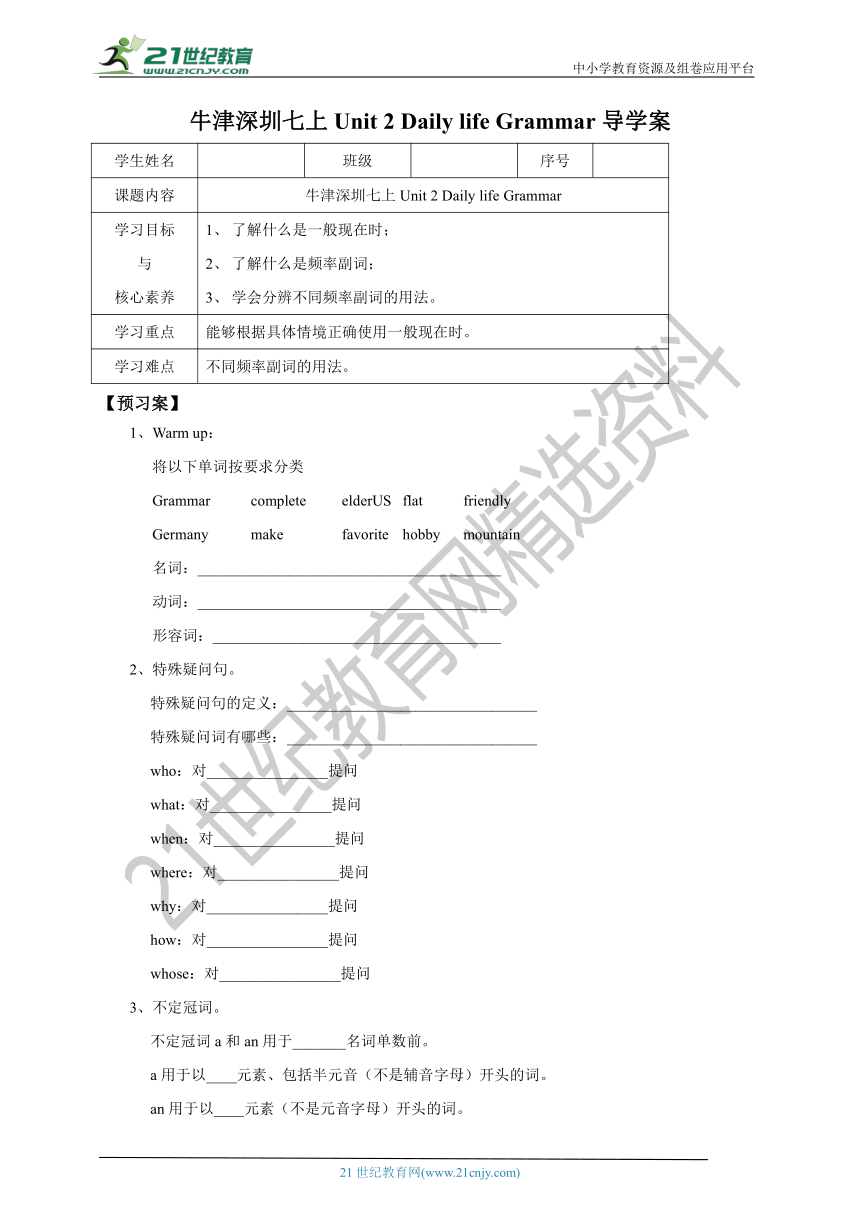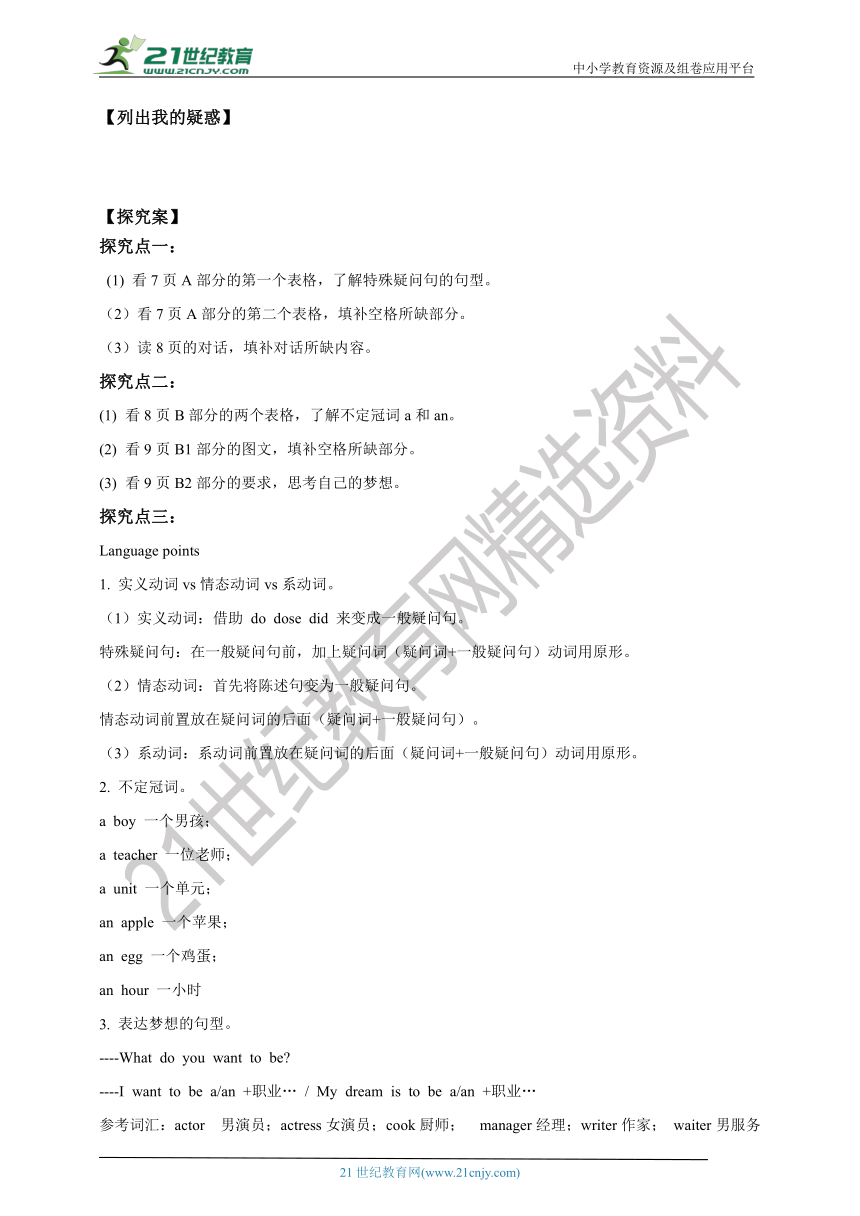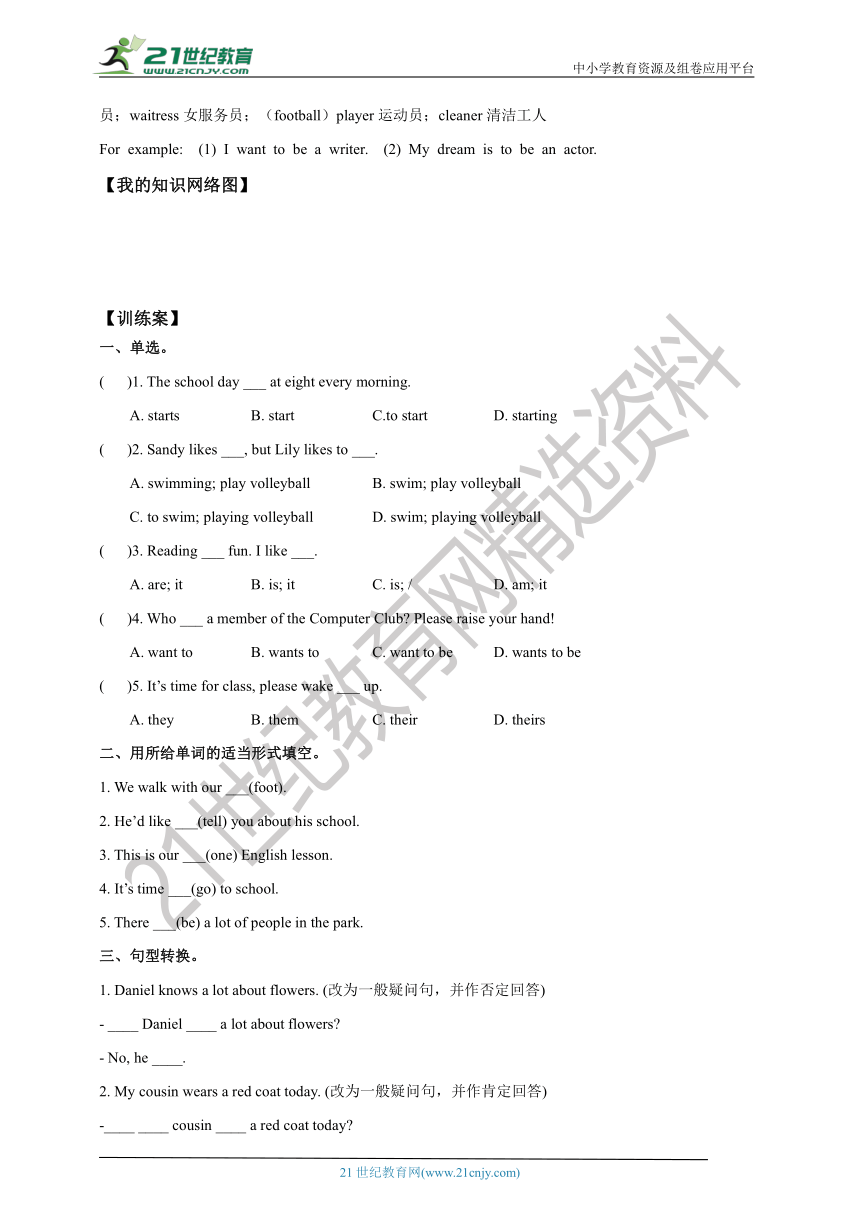Unit 2 Daily life Period 3 Grammar 导学单
文档属性
| 名称 | Unit 2 Daily life Period 3 Grammar 导学单 |  | |
| 格式 | zip | ||
| 文件大小 | 1.1MB | ||
| 资源类型 | 试卷 | ||
| 版本资源 | 牛津深圳版 | ||
| 科目 | 英语 | ||
| 更新时间 | 2020-07-06 17:44:51 | ||
图片预览



文档简介
中小学教育资源及组卷应用平台
牛津深圳七上Unit
2
Daily
life
Grammar导学案
学生姓名
班级
序号
课题内容
牛津深圳七上Unit
2
Daily
life
Grammar
学习目标与核心素养
了解什么是一般现在时;了解什么是频率副词;学会分辨不同频率副词的用法。
学习重点
能够根据具体情境正确使用一般现在时。
学习难点
不同频率副词的用法。
【预习案】
1、Warm
up:
将以下单词按要求分类
Grammar
complete
elder
US
flat
friendly
Germany
make
favorite
hobby
mountain
名词:________________________________________
动词:________________________________________
形容词:______________________________________
特殊疑问句。
特殊疑问句的定义:_________________________________
特殊疑问词有哪些:_________________________________
who:对________________提问
what:对________________提问
when:对________________提问
where:对________________提问
why:对________________提问
how:对________________提问
whose:对________________提问
不定冠词。
不定冠词a和an用于_______名词单数前。
a用于以____元素、包括半元音(不是辅音字母)开头的词。
an用于以____元素(不是元音字母)开头的词。
【列出我的疑惑】
【探究案】
探究点一:
(1)
看7页A部分的第一个表格,了解特殊疑问句的句型。
(2)看7页A部分的第二个表格,填补空格所缺部分。
(3)读8页的对话,填补对话所缺内容。
探究点二:
看8页B部分的两个表格,了解不定冠词a和an。
看9页B1部分的图文,填补空格所缺部分。
看9页B2部分的要求,思考自己的梦想。
探究点三:
Language
points
1.
实义动词vs情态动词vs系动词。
(1)实义动词:借助?do?dose?did?来变成一般疑问句。
特殊疑问句:在一般疑问句前,加上疑问词(疑问词+一般疑问句)动词用原形。
(2)情态动词:首先将陈述句变为一般疑问句。
情态动词前置放在疑问词的后面(疑问词+一般疑问句)。
(3)系动词:系动词前置放在疑问词的后面(疑问词+一般疑问句)动词用原形。
2.
不定冠词。
a?boy
一个男孩;
a?teacher?一位老师;
a?unit
一个单元;
an?apple
一个苹果;
an?egg
一个鸡蛋;?
an?hour
一小时
3.
表达梦想的句型。
----What?do?you?want?to?be??
----I?want?to?be?a/an?+职业…?/?My?dream?is?to?be?a/an?+职业…?
参考词汇:actor
男演员;actress女演员;cook厨师;
manager经理;writer作家;?waiter男服务员;waitress女服务员;(football)player运动员;cleaner清洁工人?
For?example:??(1)?I?want?to?be?a?writer.??(2)?My?dream?is?to?be?an?actor.
【我的知识网络图】
【训练案】
一、单选。
(
)1.
The
school
day
___
at
eight
every
morning.
A.
starts
B.
start
C.to
start
D.
starting
(
)2.
Sandy
likes
___,
but
Lily
likes
to
___.
A.
swimming;
play
volleyball
B.
swim;
play
volleyball
C.
to
swim;
playing
volleyball
D.
swim;
playing
volleyball
(
)3.
Reading
___
fun.
I
like
___.
A.
are;
it
B.
is;
it
C.
is;
/
D.
am;
it
(
)4.
Who
___
a
member
of
the
Computer
Club?
Please
raise
your
hand!
A.
want
to
B.
wants
to
C.
want
to
be
D.
wants
to
be
(
)5.
It’s
time
for
class,
please
wake
___
up.
A.
they
B.
them
C.
their
D.
theirs
二、用所给单词的适当形式填空。
1.
We
walk
with
our
___(foot).
2.
He’d
like
___(tell)
you
about
his
school.
3.
This
is
our
___(one)
English
lesson.
4.
It’s
time
___(go)
to
school.
5.
There
___(be)
a
lot
of
people
in
the
park.
三、句型转换。
1.
Daniel
knows
a
lot
about
flowers.
(改为一般疑问句,并作否定回答)
-
____
Daniel
____
a
lot
about
flowers?
-
No,
he
____.
2.
My
cousin
wears
a
red
coat
today.
(改为一般疑问句,并作肯定回答)
-____
____
cousin
____
a
red
coat
today?
-
Yes,
he
____.
3.
I
like
my
school
very
much.
(改为一般疑问句)
____
____
like
____
school
very
much?
4.
They
do
morning
exercises
every
day.
(改为否定句)
They
____
____
morning
exercises
every
day.
5.
Amy
likes
singing
and
dancing.
(对画线部分提问)
____
____
Amy
like?
四、阅读理解。
There?is?a?one-day?holiday?in?most?countries?on?New?Year’s?Day?(元旦).?The?real?celebrating?(庆祝)?for?New?Year?happens?on?the?night?before?─?on?New?Year’
s?Eve.?There?are?some?interesting?customs?in?the?West,?and?there?are?many?differences?from?country?to?country.
Though?Christmas?is?a?time?for?family?to?get?together,?New?Year’s?Eve?for?some?people?is?a?time?to?be?with?friends,?too.?Parties?are?often?held?(举行)?to?welcome?New?Year.?At?such?parties,?there?is?food?and?drink?and?dancing?until?the?time?nears?for?the?coming?of?New?Year.
At?midnight,?people?often?say?“Happy?New?Year”?to?each?other.?Champagne?(香槟)?is?a?favorite?drink?for?New?Year’s?Eve.?In?many?western?(西方的)?countries?fireworks?are?let?off?(燃放)?at?midnight,?and?many?people?like?to?make?a?noise,?possibly?to?drive?away?(赶走)?bad?spirits?(精灵).
One?important?song?at?New?Year’s?Eve?is?the?Scottish?song?of?Auld?Lang?Syne?(友谊地久天长).
1.People?usually?have?great?celebrations?for?New?Year?on?____?.
A.?the?night?before?New?Year’s?Eve?
B.?New?Year’s?Day??
C.?the?night?before?New?Year’s?Day?
D.?the?night?of?New?Year’s?Day?
2.?In?the?West,?New?Year’s?Eve?is?also?a?time?for
____.?
A.?people?to?go?from?country?to?country?
B.?people?to?have?a?week’s?holiday?
C.?friends?to?write?to?each?other?
D.?friends?to?get?together?
3.?The?Chinese?meaning?of?the?word?“custom”?is?____.?
A.?聚会?
B.?习俗?
C.?劳动?
D.?饮食?
4.?At?midnight?on?New?Year’s?Eve,?western?people?often?___.?
①hold?parties?to?welcome?New?Year?
②Make?a?noise?to?drive?away?bad?spirits?
③drink?with?friends?or?families?
④say?“Happy?New?Year”?to?each?other???
⑤sing?an?important?French?song?
⑥let?off?fireworks?in?the?day?time???
A.①②⑤⑥
B.?
①②③④
C.
②③④⑥
D.
③④⑤⑥
5.?This?passage?mainly?talks?about?___.?
A.?how?western?people?spend?their?New?Year’s?Eve?
???
B.?that?western?people?have?a?good?time?on?New?Year’s?Day????
C.?what?western?people?do?on?New?Year’s?Day?
???
D.?that?western?people?drink?together?on?New?Year’s?Eve
答案:
一、AABDB
二、1.feet
2.to
tell
3.first
4.to
go
5.are
三、1.
Does;
know;
doesn’t
2.
Does;
your;
wear;
does
3.
Do;
you;
your
4.
don’t
do
5.
What
does
四、CDBBA
【教与学的反思】
21世纪教育网
www.21cnjy.com
精品试卷·第
2
页
(共
2
页)
HYPERLINK
"http://www.21cnjy.com/"
21世纪教育网(www.21cnjy.com)
牛津深圳七上Unit
2
Daily
life
Grammar导学案
学生姓名
班级
序号
课题内容
牛津深圳七上Unit
2
Daily
life
Grammar
学习目标与核心素养
了解什么是一般现在时;了解什么是频率副词;学会分辨不同频率副词的用法。
学习重点
能够根据具体情境正确使用一般现在时。
学习难点
不同频率副词的用法。
【预习案】
1、Warm
up:
将以下单词按要求分类
Grammar
complete
elder
US
flat
friendly
Germany
make
favorite
hobby
mountain
名词:________________________________________
动词:________________________________________
形容词:______________________________________
特殊疑问句。
特殊疑问句的定义:_________________________________
特殊疑问词有哪些:_________________________________
who:对________________提问
what:对________________提问
when:对________________提问
where:对________________提问
why:对________________提问
how:对________________提问
whose:对________________提问
不定冠词。
不定冠词a和an用于_______名词单数前。
a用于以____元素、包括半元音(不是辅音字母)开头的词。
an用于以____元素(不是元音字母)开头的词。
【列出我的疑惑】
【探究案】
探究点一:
(1)
看7页A部分的第一个表格,了解特殊疑问句的句型。
(2)看7页A部分的第二个表格,填补空格所缺部分。
(3)读8页的对话,填补对话所缺内容。
探究点二:
看8页B部分的两个表格,了解不定冠词a和an。
看9页B1部分的图文,填补空格所缺部分。
看9页B2部分的要求,思考自己的梦想。
探究点三:
Language
points
1.
实义动词vs情态动词vs系动词。
(1)实义动词:借助?do?dose?did?来变成一般疑问句。
特殊疑问句:在一般疑问句前,加上疑问词(疑问词+一般疑问句)动词用原形。
(2)情态动词:首先将陈述句变为一般疑问句。
情态动词前置放在疑问词的后面(疑问词+一般疑问句)。
(3)系动词:系动词前置放在疑问词的后面(疑问词+一般疑问句)动词用原形。
2.
不定冠词。
a?boy
一个男孩;
a?teacher?一位老师;
a?unit
一个单元;
an?apple
一个苹果;
an?egg
一个鸡蛋;?
an?hour
一小时
3.
表达梦想的句型。
----What?do?you?want?to?be??
----I?want?to?be?a/an?+职业…?/?My?dream?is?to?be?a/an?+职业…?
参考词汇:actor
男演员;actress女演员;cook厨师;
manager经理;writer作家;?waiter男服务员;waitress女服务员;(football)player运动员;cleaner清洁工人?
For?example:??(1)?I?want?to?be?a?writer.??(2)?My?dream?is?to?be?an?actor.
【我的知识网络图】
【训练案】
一、单选。
(
)1.
The
school
day
___
at
eight
every
morning.
A.
starts
B.
start
C.to
start
D.
starting
(
)2.
Sandy
likes
___,
but
Lily
likes
to
___.
A.
swimming;
play
volleyball
B.
swim;
play
volleyball
C.
to
swim;
playing
volleyball
D.
swim;
playing
volleyball
(
)3.
Reading
___
fun.
I
like
___.
A.
are;
it
B.
is;
it
C.
is;
/
D.
am;
it
(
)4.
Who
___
a
member
of
the
Computer
Club?
Please
raise
your
hand!
A.
want
to
B.
wants
to
C.
want
to
be
D.
wants
to
be
(
)5.
It’s
time
for
class,
please
wake
___
up.
A.
they
B.
them
C.
their
D.
theirs
二、用所给单词的适当形式填空。
1.
We
walk
with
our
___(foot).
2.
He’d
like
___(tell)
you
about
his
school.
3.
This
is
our
___(one)
English
lesson.
4.
It’s
time
___(go)
to
school.
5.
There
___(be)
a
lot
of
people
in
the
park.
三、句型转换。
1.
Daniel
knows
a
lot
about
flowers.
(改为一般疑问句,并作否定回答)
-
____
Daniel
____
a
lot
about
flowers?
-
No,
he
____.
2.
My
cousin
wears
a
red
coat
today.
(改为一般疑问句,并作肯定回答)
-____
____
cousin
____
a
red
coat
today?
-
Yes,
he
____.
3.
I
like
my
school
very
much.
(改为一般疑问句)
____
____
like
____
school
very
much?
4.
They
do
morning
exercises
every
day.
(改为否定句)
They
____
____
morning
exercises
every
day.
5.
Amy
likes
singing
and
dancing.
(对画线部分提问)
____
____
Amy
like?
四、阅读理解。
There?is?a?one-day?holiday?in?most?countries?on?New?Year’s?Day?(元旦).?The?real?celebrating?(庆祝)?for?New?Year?happens?on?the?night?before?─?on?New?Year’
s?Eve.?There?are?some?interesting?customs?in?the?West,?and?there?are?many?differences?from?country?to?country.
Though?Christmas?is?a?time?for?family?to?get?together,?New?Year’s?Eve?for?some?people?is?a?time?to?be?with?friends,?too.?Parties?are?often?held?(举行)?to?welcome?New?Year.?At?such?parties,?there?is?food?and?drink?and?dancing?until?the?time?nears?for?the?coming?of?New?Year.
At?midnight,?people?often?say?“Happy?New?Year”?to?each?other.?Champagne?(香槟)?is?a?favorite?drink?for?New?Year’s?Eve.?In?many?western?(西方的)?countries?fireworks?are?let?off?(燃放)?at?midnight,?and?many?people?like?to?make?a?noise,?possibly?to?drive?away?(赶走)?bad?spirits?(精灵).
One?important?song?at?New?Year’s?Eve?is?the?Scottish?song?of?Auld?Lang?Syne?(友谊地久天长).
1.People?usually?have?great?celebrations?for?New?Year?on?____?.
A.?the?night?before?New?Year’s?Eve?
B.?New?Year’s?Day??
C.?the?night?before?New?Year’s?Day?
D.?the?night?of?New?Year’s?Day?
2.?In?the?West,?New?Year’s?Eve?is?also?a?time?for
____.?
A.?people?to?go?from?country?to?country?
B.?people?to?have?a?week’s?holiday?
C.?friends?to?write?to?each?other?
D.?friends?to?get?together?
3.?The?Chinese?meaning?of?the?word?“custom”?is?____.?
A.?聚会?
B.?习俗?
C.?劳动?
D.?饮食?
4.?At?midnight?on?New?Year’s?Eve,?western?people?often?___.?
①hold?parties?to?welcome?New?Year?
②Make?a?noise?to?drive?away?bad?spirits?
③drink?with?friends?or?families?
④say?“Happy?New?Year”?to?each?other???
⑤sing?an?important?French?song?
⑥let?off?fireworks?in?the?day?time???
A.①②⑤⑥
B.?
①②③④
C.
②③④⑥
D.
③④⑤⑥
5.?This?passage?mainly?talks?about?___.?
A.?how?western?people?spend?their?New?Year’s?Eve?
???
B.?that?western?people?have?a?good?time?on?New?Year’s?Day????
C.?what?western?people?do?on?New?Year’s?Day?
???
D.?that?western?people?drink?together?on?New?Year’s?Eve
答案:
一、AABDB
二、1.feet
2.to
tell
3.first
4.to
go
5.are
三、1.
Does;
know;
doesn’t
2.
Does;
your;
wear;
does
3.
Do;
you;
your
4.
don’t
do
5.
What
does
四、CDBBA
【教与学的反思】
21世纪教育网
www.21cnjy.com
精品试卷·第
2
页
(共
2
页)
HYPERLINK
"http://www.21cnjy.com/"
21世纪教育网(www.21cnjy.com)
